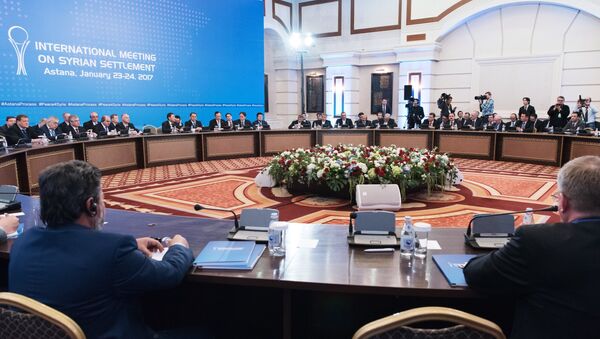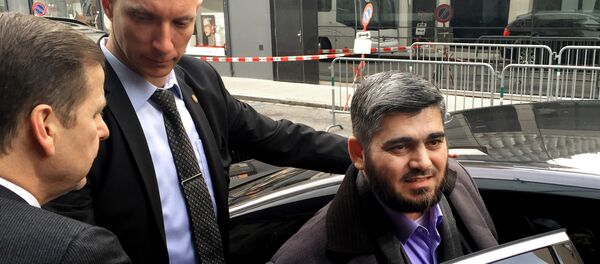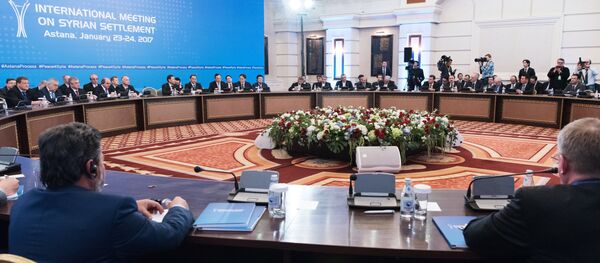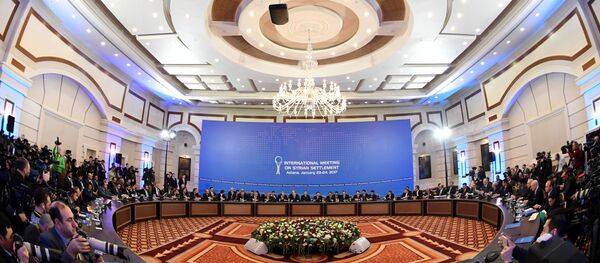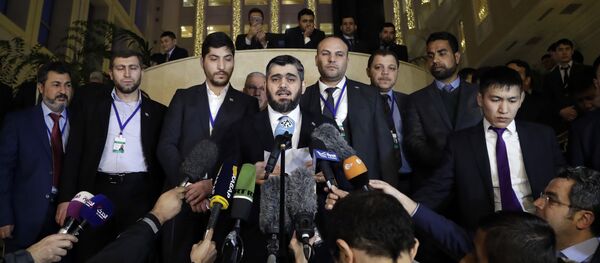MOSCOW (Sputnik) – On December 14, 2016, Russian President Vladimir Putin had a telephone conversation with his Turkish counterpart Recep Tayyip Erdogan. Both Putin and Erdogan agreed to suggest that the warring parties in Syria continue their peace talks in another format and not just in Geneva. Astana, the capital of Kazakhstan, was named as a possible venue. Russia made this proposal to the Syrian government, with Turkey doing the same to the armed opposition’s representatives.
Kazakhstan’s President Nursultan Nazarbayev supported Putin’s proposal to conduct the Syrian peace process in Astana.
On December 20, 2016, the foreign ministers of Iran, Russia and Turkey issued a joint statement after their Moscow talks. The statement listed agreed-upon measures aiming to invigorate the political process and to stop the Syrian conflict. The parties voiced their readiness to help draft a future agreement between the Syrian government and the opposition and to act as the guarantors of this document which is currently being negotiated. They invited all countries influencing the situation on the ground to act likewise.
The talks in Astana are called on to formalize the current ceasefire regime stipulated by the December 29, 2016 agreements and to help maintain direct dialogue between the government and the opposition under UN Security Council Resolution 2254.
Apart from the government delegation and the armed opposition, the Astana talks involved Russian, Turkish and Iranian representatives, as well as UN officials. Moscow, Ankara and Tehran act as guarantors of the ceasefire agreement. Russian diplomats and military experts in Astana included Special Presidential Representative for Syria Alexander Lavrentyev, Foreign Ministry's Middle East and North Africa Department (MENAD) Director Sergey Vershinin and Deputy Chief of the Russian General Staff's Main Operational Directorate Lt. Gen. Stanislav Gadzhimagomedov. The Turkish Foreign Ministry's Deputy Undersecretary Sedat Onal headed the Turkish delegation. Iranian Deputy Foreign Minister for Arab and African Affairs Hossein Jaberi Ansari represented the interests of Tehran at the consultations. The United Nations sent UN and Arab League Envoy to Syria Staffan de Mistura. US Ambassador in Kazakhstan George A. Krol attended the talks as an observer.
The Astana meeting became the first case when the Damascus delegation and that of the armed opposition sat down at one negotiating table. Earlier, all paramilitary units fighting on the ground were barred from talks on Syria’s political future.
Mediators failed to convince the warring parties to negotiate the ceasefire agreement face to face and without the guarantor countries. Both Syrian delegations conducted indirect talks instead.
An agreement on establishing a trilateral mechanism for monitoring the ceasefire regime in the Syrian Arab Republic by Russia, Iran and Turkey, as guarantors of the Syrian truce, became one of the talks’ main military results. The parties did their best to separate the opposition from terrorist groups. Earlier, it was impossible to reach the same agreement with the United States. For example, military negotiators managed to coordinate demarcation lines with the Islamic State (IS, banned in Russia) terror group and also moved to determine the positions of the terrorist of the Jabhat al-Nusra terror group, also banned in Russia.
Moscow, Tehran and Ankara also supported the armed opposition’s desire to take part in UN-brokered talks in Geneva.
Russia submitted proposals on the draft Syrian constitution to the national opposition. Russia has thus launched a discussion on the fundamental law’s contents, Foreign Minister Sergey Lavrov noted.
On February 6, Astana hosted the first meeting of a joint group, established under agreements at the January 23-24 international meeting on Syria in Astana. Russian, Turkish and Iranian experts discussed the fulfillment of agreements on the Syrian truce, the monitoring mechanism, and confidence-building measures.

On February 15-16, 2017, Astana hosted the second round of Astana talks on resolving the Syrian conflict. The talks involved delegations of guarantor countries, which are Russia, Iran and Turkey. Jaafari, headed the Syrian government delegation, Alloush headed the nine-person opposition delegation. Representatives of Jordan and the United States were invited as observers, with the United Nations sending in a five-person delegation.
The two-day multi-format talks were held behind closed doors and involved Russia, Iran and Turkey, the Syrian government delegation, that of the armed opposition, as well as Jordanian and US representatives and a five-person UN delegation. Some participants expressed concern with the representation level of the Turkish delegation, headed by the chief of the Turkish Foreign Ministry’s Directorate General of Middle East Affairs. Representatives of the armed opposition did not join the talks before February 16.
The second round of the Astana talks produced the following main result: the parties finalized an agreement on establishing a group to monitor the Syrian truce with the involvement of Iran, Russia and Turkey. The Russian Foreign Ministry called the meeting successful, with representatives of the Syrian armed opposition voicing a pessimistic opinion of the talks. Nevertheless, they agreed to establish a truce commission but opposed Iran’s involvement in its work.
Despite objections of the Syrian opposition delegation’s members concerning the involvement of Iran, voiced by Alloush, the appropriate document formalized a decision to establish a joint group consisting of Russia, Iran and Turkey.
The parties to the talks managed to formulate a prisoner exchange mechanism and coordinated a clause on exchanging the bodies of those killed in action.
On March 14-17, Astana hosted the third round of talks on the Syrian peace settlement. The Syrian armed opposition decided not to send their representatives to Astana. A planned plenary meeting, therefore, did not take place, with the parties focusing on multi-format consultations. The parties discussed the release of prisoners and made headway on these issues. They agreed to establish a working group and to further separate the moderate opposition from terrorist groups; they also compared their positions on these issues. Moreover, they started discussing the rather complicated issue of establishing the constitutional commission and also raised the entirely new issue of possibly drawing the efforts of various countries to rebuild ancient Syrian landmarks, including the legendary Palmyra.
In a joint statement on the results of the talks, guarantor countries confirmed their commitment to the Syrian peace settlement and underscored the importance of the third round of Astana talks for the Geneva process.
On May 3-4, 2017, Astana hosted the fourth round of talks on the Syrian peace settlement that also involved representatives of guarantor countries as well as representatives of the United States, the United Nations, the Syrian government and the opposition.
During the second day of the talks, the parties signed a memorandum on establishing four security zones in Syria, including one zone in Idlib province and parts of the neighboring Latakia, Hama and Aleppo, the north of the central Homs province, Eastern Ghouta near Damascus, as well as southern Daraa and Quneitra regions. Under the memorandum, it is forbidden to use any type of weapons, including military aircraft, in these zones starting from May 6, while military authorities should demarcate these zones in advance. In addition, the document stipulates quick, safe and unimpeded humanitarian relief aid deliveries to de-escalation zones.
Deputy Iranian Foreign Hossein Jaberi Ansari said the parties should start fulfilling the provisions of the memorandum on establishing four de-escalation zones in Syria one month after signing. Special Presidential Representative for Syria Alexander Lavrentyev, the head of the Russian delegation, noted that Syrian de-escalation zones shall be established for a period of six months and extended for another six months, and that the memorandum could have an unlimited duration.
Representatives of the Syrian opposition involved in the talks issued an appeal to the guarantors of the Syrian truce, and noted that the creation of security zones in Syria should not become an alternative to the political process.
Astana meeting participants also reviewed issues regarding the establishment of a working group to exchange forcibly detained persons and discussed the relevant draft document.
